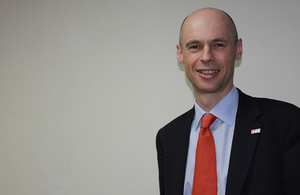UK Space Agency announces new Chief Executive
The UK Space Agency has announced the appointment of a new Chief Executive, Graham Turnock.

Graham has been Chief Executive of the Better Regulation Executive, a unit within the Department for Business, Energy and Industrial Strategy, since 2011. He has a BA and a PhD in Particle Physics from Cambridge University for theoretical work on collision experiments at CERN. He also holds a diploma in public administration from the École Nationale d’Administration (ENA).
Graham has extensive experience across Whitehall and at a European level – a key priority for the Agency’s head. He has worked in the European Commission and held several other posts in the UK Civil Service with a strong European element, including the Treasury’s lead on the EU budget.
Recently he has been the BEIS representative on the Met Office board while outside of work he is a trustee of the Youth Hostels Association and a keen cyclist.
As the UK Space Agency’s Chief Executive Graham will lead a team of more than 100 who manage the UK’s civil space policy, regulation and programmes. He will be responsible for realising the agency’s aims of increasing the size of the UK space industry, using space to understand planet Earth and the universe, supporting British businesses to deliver practical help to developing countries and overseeing the Agency’s plans to establish commercial space flight in the UK.
Graham will take up his new role on the 1st of April. He replaces Interim Chief Executive Katherine Courtney, who has been with the Agency since April, 2016. During her time Katherine guided the Agency through the European Council of Ministers in Lucerne, Switzerland, where the UK committed to European collaboration on science and exploration, satellite technology and services, allocating more than €1.4 billion over five years to European Space Agency programmes.
Katherine also led the Agency at a key time for commercial spaceflight in the UK, inviting commercial space consortia to apply for grant funding to enable small-satellite launches and sub-orbital flights from the UK by 2020.